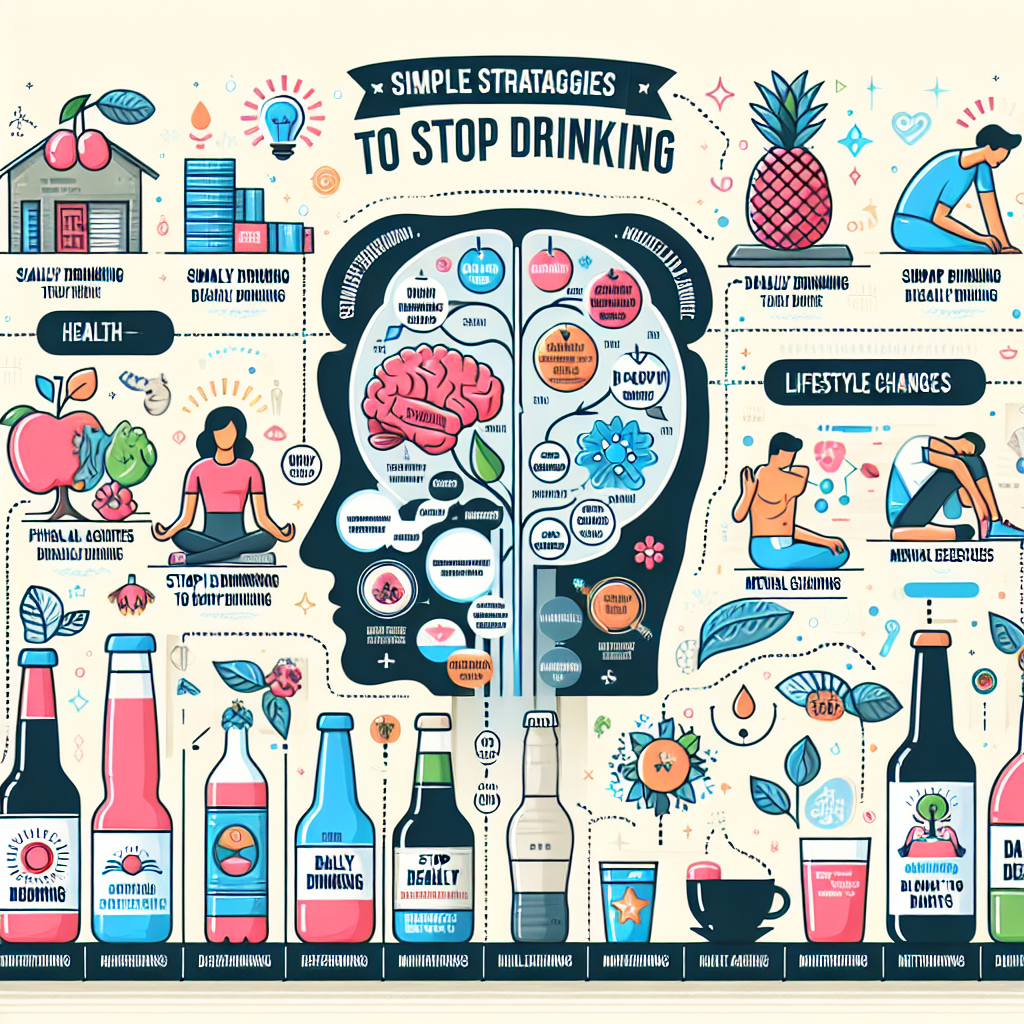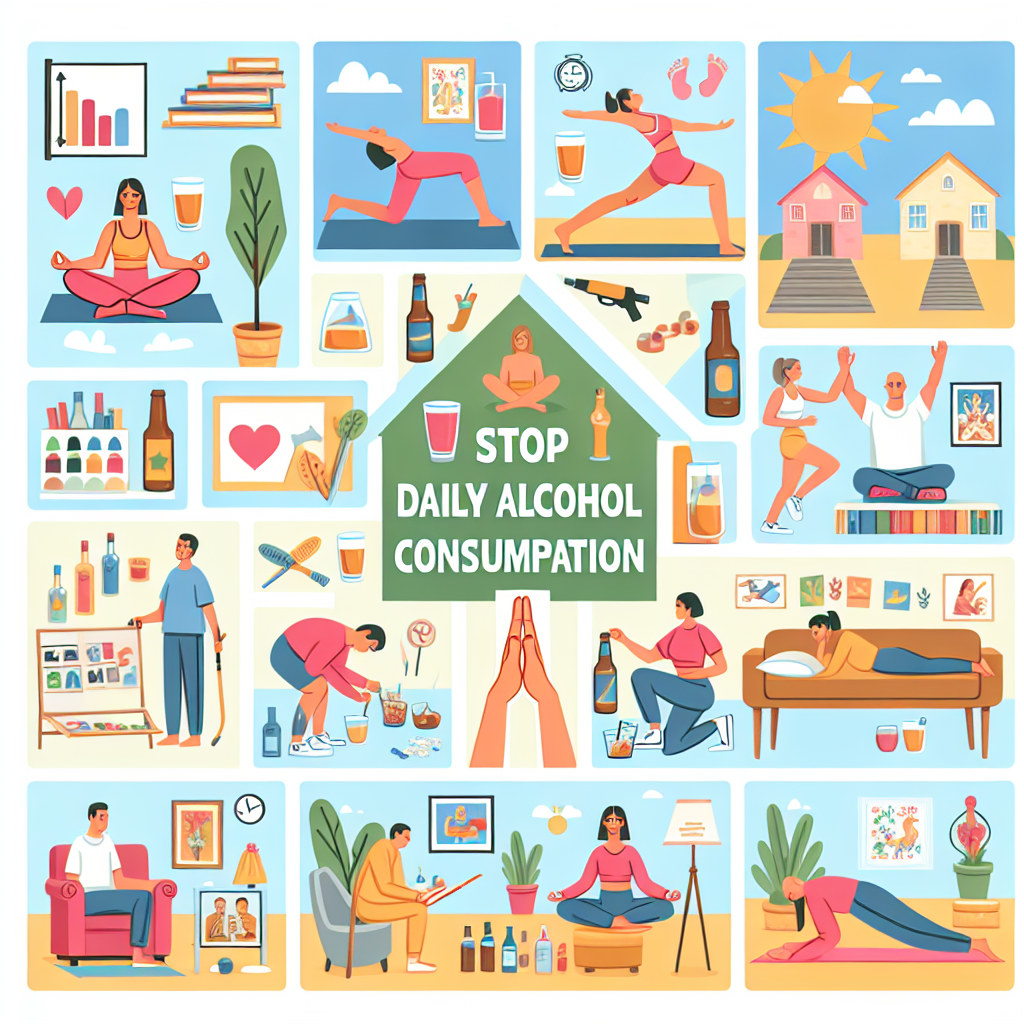-
Table of Contents

“Empower Your Life: Simple Strategies to Break Free from Daily Drinking”
Introduction
Quitting daily drinking can be a challenging but achievable goal. Simple strategies to stop drinking every day include setting clear goals, identifying triggers, seeking support, and finding healthier alternatives. By understanding the underlying reasons for drinking and implementing practical steps, individuals can gradually reduce their alcohol consumption and improve their overall well-being.
Effective Daily Habits to Reduce Alcohol Consumption
Reducing daily alcohol consumption can be a challenging yet rewarding journey, and adopting effective daily habits can make a significant difference. One of the first steps in this process is to set clear, achievable goals. Instead of aiming to quit drinking entirely from the outset, consider setting smaller, more manageable targets. For instance, you might start by reducing the number of drinks you have each day or designating certain days of the week as alcohol-free. This gradual approach can help you build confidence and momentum, making the overall goal feel less daunting.
In addition to setting goals, it is crucial to identify and understand your triggers. Many people drink out of habit or in response to stress, boredom, or social pressure. By recognizing the situations or emotions that prompt you to reach for a drink, you can develop strategies to cope with these triggers in healthier ways. For example, if stress is a significant factor, you might explore relaxation techniques such as deep breathing exercises, meditation, or yoga. These practices can help you manage stress more effectively and reduce the urge to drink.
Another effective habit is to find alternative activities that bring you joy and fulfillment. Engaging in hobbies or interests that you are passionate about can provide a sense of purpose and satisfaction, making it easier to resist the temptation to drink. Whether it’s painting, gardening, playing a musical instrument, or participating in sports, immersing yourself in activities that you love can be a powerful distraction from alcohol. Additionally, physical exercise is particularly beneficial, as it not only improves your overall health but also releases endorphins, which can boost your mood and reduce cravings.
Building a strong support system is also essential in your journey to reduce alcohol consumption. Surrounding yourself with friends and family who understand your goals and encourage your efforts can provide the motivation and accountability you need. Consider joining a support group or seeking professional help if necessary. Sharing your experiences and challenges with others who are on a similar path can be incredibly reassuring and inspiring.
Moreover, it is important to create an environment that supports your new habits. This might involve removing alcohol from your home or at least keeping it out of sight. Stock your kitchen with healthy snacks and beverages that you enjoy, so you have appealing alternatives readily available. When socializing, plan activities that do not revolve around drinking, such as going for a hike, visiting a museum, or having a picnic in the park. By making these changes, you can reduce the temptation to drink and reinforce your commitment to your goals.
Lastly, practice self-compassion and patience throughout this process. Changing long-standing habits takes time and effort, and setbacks are a natural part of the journey. If you have a slip-up, do not be too hard on yourself. Instead, view it as an opportunity to learn and grow. Reflect on what led to the lapse and how you can address it differently in the future. Celebrate your progress, no matter how small, and remind yourself of the positive reasons behind your decision to cut back on alcohol.
In conclusion, reducing daily alcohol consumption is a multifaceted endeavor that requires a combination of goal-setting, self-awareness, alternative activities, support, environmental changes, and self-compassion. By incorporating these effective daily habits into your routine, you can gradually decrease your reliance on alcohol and move towards a healthier, more fulfilling lifestyle. Remember, every step you take is a step towards a better you, and the journey itself is a testament to your strength and determination.
Mindful Techniques to Break the Daily Drinking Cycle
Breaking the cycle of daily drinking can be a challenging yet transformative journey. By incorporating mindful techniques, individuals can gradually shift their habits and embrace a healthier lifestyle. One effective strategy is to start by identifying the triggers that lead to daily drinking. These triggers can be emotional, such as stress or boredom, or situational, like social gatherings or specific times of the day. Recognizing these patterns is the first step toward change, as it allows individuals to anticipate and prepare for moments of vulnerability.
Once triggers are identified, it is crucial to develop alternative coping mechanisms. For instance, if stress is a primary trigger, engaging in activities that promote relaxation and well-being can be beneficial. Practices such as meditation, deep breathing exercises, or yoga can help manage stress levels and provide a sense of calm without the need for alcohol. Additionally, physical exercise is a powerful tool in this regard. Regular workouts not only improve physical health but also release endorphins, which can enhance mood and reduce the desire to drink.
Another mindful technique is to set clear and achievable goals. Instead of aiming to quit drinking entirely from the outset, it may be more practical to gradually reduce consumption. Setting specific, measurable goals, such as limiting drinking to certain days of the week or reducing the number of drinks per day, can make the process more manageable. Celebrating small victories along the way can also boost motivation and reinforce positive behavior.
In addition to setting goals, creating a supportive environment is essential. Surrounding oneself with friends and family who understand and respect the decision to cut back on drinking can provide encouragement and accountability. It may also be helpful to seek out social activities that do not revolve around alcohol. Exploring new hobbies, joining clubs, or participating in community events can offer fulfilling alternatives and reduce the temptation to drink.
Mindfulness itself plays a significant role in breaking the daily drinking cycle. Practicing mindfulness involves being fully present in the moment and observing thoughts and feelings without judgment. This heightened awareness can help individuals recognize cravings as they arise and understand the underlying emotions driving them. By acknowledging these feelings rather than acting on them impulsively, individuals can make more conscious choices about their behavior.
Moreover, keeping a journal can be an effective way to track progress and reflect on the journey. Writing down thoughts, feelings, and experiences related to drinking can provide valuable insights and highlight patterns that may not be immediately apparent. This practice can also serve as a therapeutic outlet, helping to process emotions and reinforce the commitment to change.
Lastly, seeking professional support can be a crucial component of success. Therapists, counselors, or support groups can offer guidance, resources, and a sense of community. These professionals can help individuals develop personalized strategies and provide ongoing support throughout the process.
In conclusion, breaking the daily drinking cycle requires a combination of self-awareness, goal-setting, and support. By identifying triggers, developing alternative coping mechanisms, and practicing mindfulness, individuals can gradually reduce their reliance on alcohol and embrace a healthier, more fulfilling lifestyle. The journey may be challenging, but with determination and the right strategies, it is entirely possible to achieve lasting change.
Q&A
1. **Question:** What is one effective strategy to reduce daily alcohol consumption?
**Answer:** One effective strategy is to set clear, achievable goals, such as limiting the number of drinks per day or designating alcohol-free days each week.
2. **Question:** How can social support help in stopping daily drinking?
**Answer:** Social support can help by providing encouragement, accountability, and understanding from friends, family, or support groups, which can make it easier to stick to your goals and find healthier ways to cope with stress.
Conclusion
In conclusion, simple strategies to stop drinking every day include setting clear goals, seeking support from friends, family, or support groups, identifying and avoiding triggers, finding healthy alternatives to alcohol, and practicing stress management techniques. These approaches can help individuals reduce or eliminate daily alcohol consumption and improve their overall well-being.



